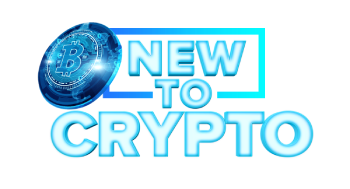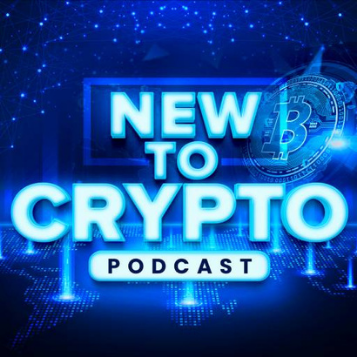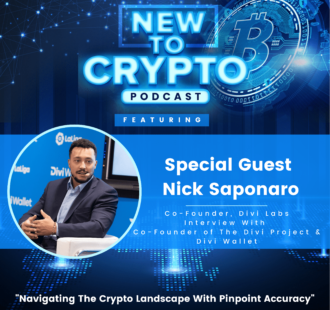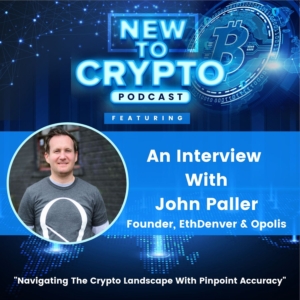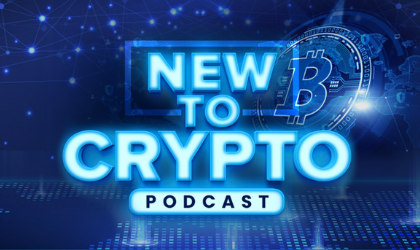Interview With Nick Saponaro Co-Founder of The Divi Project and Divi Wallet
SUMMARY KEYWORDS
divi, divi wallet, divi project, crypto, wallet, people, staking, blockchain, user, industry, coins, cryptocurrencies, finance, decentralized, bitcoin, la liga, interoperability, centralized exchanges
SPEAKERS
Crypto Travels Michael, Nick Saponaro
00:00
Today’s episode is not one to miss. I have Nick Saponaro and the co-founder of Divi here today, Divi is one of the easiest wallets to install and use. By the way, as well as so many other components that Divi offers. They also just did a partnership with La Liga, which will be bringing all things crypto to some of your favorite football stadiums. Definitely do not miss this episode.
00:25
Welcome to the New To Crypto Podcast designed to guide you through the crypto landscape with pinpoint accuracy created for the new and intermediate crypto investor. Join your host Crypto Travels Michael as he takes you through the different facets of getting started and succeeding in your crypto journey. New To Crypto Podcast brings you new episodes daily Monday through Friday with surprise bonus episodes sometimes on the weekend. Let me ask you, Are you new to crypto and don’t know where to start? Are you more experienced but have questions? Then you’re at the right place. This podcast is designed for you coming at you from the training center in the lifestyle design studio. Here’s your host Crypto Travels Michael.
01:18
Brave wallet is the first secure crypto wallet built natively in a web three crypto browser, no extension required. You can store, manage and grow your portfolio, get NFT’s and multi chain support. Download the brave privacy browser at Brave comm slash new to crypto and click on the wallet icon to get started. I’m excited about this episode. Today I’m joined here with a veteran in the crypto industry, the co-founder of a very well known project in the industry. Nick, it’s a pleasure to have you join us today. Hey, Michael. It’s a pleasure to be here. Thank you. Excellent. Can you tell our listeners just a little bit about yourself before we dive in? Absolutely. My name is Nick Saponero. I’m the co-founder and CEO of Divi Labs. We founded the Divi project back in 2017. I’ve been in space for a little bit longer than I got in around 2013. I was building some mining rigs for people that I wasn’t super aware of exactly what Bitcoin was. That was my first introduction to the asset class. But it wasn’t really until 2015 When a buddy of mine somewhat forcibly got me into Ethereum. And being a web developer at the time, I found a lot of a lot more interest actually in Ethereum than I had with Bitcoin because of the capabilities of smart contracts and things of that nature. But I still believed in the tenets of built Bitcoin was built upon, you know, this democratized finance system that was borderless and accessible anywhere you were really decentralized and without the, you know, the third party intermediaries that was very appealing to me as a kind of a rebel kid, still to this day as an adult. So in 2017, I was brought on to Divi as a freelance web developer, just to build their website. And of course, I had been investing in the space and studying it for a while. So I was able to contribute to the white paper, the original white paper for the Divi project. And after some time working with the team, they were like, Hey, do you want to become a co-founder before we launched this thing, which to me was like a dream come true. And it’s led me down a path that I never could have dreamed or imagined and you know, become a professional in a space and eventually became the CEO of the company, which is where I sit today. Wow, man, thanks for sharing that I actually didn’t know that backstory on it. You know, I’m definitely very familiar with the Divi project and Divi wallet. And yeah, thanks for unpacking that. Can you tell us and our listeners in a nutshell, what is the Divi project and Divi Wallet? So Divi is essentially built upon a single singular philosophy that cryptocurrency should be easy to use and accessible to everyone everywhere. Now, that may sound a little bit broad or generic. But in 2017, most people were focusing on hyper niche singular use cases. They weren’t focusing on the user experience around those use cases. And still, even to this day, the user experience could use some improvement, although it has improved a lot throughout the industry. So we felt that if we could make one of the most difficult things easy, which at the time was setting up a masternode, then we could probably make many things for every coin, very easy. So in 2018, September of 2018, we deployed what’s called the masternode one click cloud installer, or mochi for short. And that allows still to this day people to set up and start earning cryptocurrency at the click of a button. It’s just as easy as you know, setting up a Spotify account or Facebook account is great. We expanded upon that by actually getting that technology patented spending now and enabling it now from a cell phone. We launched her mobile wallet back in 2001. Money, where now you can actually just with the swipe of a finger, sort of a masternode, a staking node, send or receive a variety of cryptocurrencies. And it’s all done within this context because it’s a very easy to use familiar interface. So you’re not seeing crazy addresses, unless you want to, of course, you’re seeing your friends face, you’re seeing a username, you can send to their phone number, their email address, things that people just expect at this point. And their mobile application experience. We’re bringing cryptocurrencies and we’re delivering it to a worldwide audience. Wow, man, I especially like how easy you’ve made it for people that are especially new to crypto, because after all, this, this show is called New To Crypto. And we have a lot of listeners around the world that are actually new. And, you know, let’s expand a little bit more about the Divi wallet and just share with our listeners a little bit more about how simple your wallet is to use. The links are on our website, so they can go over there and install and use your wallet. But how is your wallet different from say other wallets? And specifically, why is your wallet so easy for someone that’s new to use? You know, it’s been a difficult sort of challenge to make something that is both self custodial, fully decentralized, and also easy. And it’s important to us that we don’t sacrifice the capability of the user to own their funds. For convenience, because we’ve done that too much in the past, right? With social media, we sacrifice our privacy for the convenience of connection. I don’t intend to continue that trend with finance, the sort of final frontier of digital ownership. So we took a very very methodical approach to building our wallet, right from the time that you download the wallet and onboard, you’re feeling as if you are just onboarding to a traditional app, we take the user through the traditional steps of you know, setting up your username, setting up your account, profile picture and things like that, if you so choose, you can actually continue to use it anonymously if you choose. But most people do choose to set it up this way with their phone numbers and things like that. Once you are onboard, then we guide you through what is the seed phrase? How do you back that up? What’s the importance of these things, we find that if you just bombard the user with all this jargon and crazy things that they’ve never seen before, you lose a lot of the users each step in the process of onboarding, this is true of any, any vertical or any industry. Each step that causes friction for the user loses more and more subsets of users. And that’s why it’s taken so long to even get a modicum of mainstream adoption in crypto. So that’s one of the biggest differentiators is actually just the onboarding steps. Once you’re in the wallet, you can see that it’s easy to send and receive your funds to your friends, shortly here in this quarter, you’ll be able to actually purchase a variety of cryptocurrencies with a credit card or or wire transfer or an ACH transfer, as well as swap Kryptos play with d phi, among other things that are that are on our short term roadmap. So you’re feeling as if you’re just using a finance app that you’ve used before, but it’s actually decentralized mobile. Awesome, awesome. Thanks for sharing it with our audience. Nick, your leader in the industry for some of our listeners that may not know that Nick is one of the oh jeez, if you will, he has a defined footprint in the industry. And let’s just change gears just for a moment. We’re gonna come back to Divi. But let’s talk for a moment about the future of crypto and the goals of decentralization. Like what are your thoughts around this? Right now? There’s a big sort of divergence, right? There’s two counterparties, if you will, in this space. There’s the sort of fundamentalists, the diehards that still believe that decentralization is the answer, that if we turn around and create basically a refreshed version of what already exists in the banking system, then we haven’t actually innovated for donating. And then you have the other side, which is the essentially custodial services that act and operate much like banks. Now, what I will say is, while I’m on the side of decentralization, and I do believe that self custody is the answer, I do see why both things will continue to exist that may or may need to continue to exist. large enterprises and even small businesses may or may not want to custodial their own funds, they may want to put that trust in someone else’s hands, which is fine, you know, you should have that opportunity. But we shouldn’t just build with that in mind, in my opinion, I think that we will see, you know, decentralized products continue to thrive. We’re seeing decentralized exchanges now getting you know, it’s that times more volume than than even the biggest centralized exchanges. As people start to learn more about the industry, they get further down the rabbit hole, and traders and users alike want to take control of their own finances in one way or the other. Dexter’s are also at times more convenient, you know, the interoperability that they offer across chains and things like that, as well as the anonymity are really attractive, especially as the regulations start to pour into the space. And we’re seeing a lot of crackdowns on Binance and some of the other large exchanges where, you know, they’re even getting banned from from countries from operating in those countries. You know, that’s a that’s an impact on users. And then impact that users don’t want to see. So they’re going to go to the services that are most convenient, and, and most usable. Definitely agree. Yeah, I definitely agree with that. What would you like to see in the future of crypto in general, like adoption? Anything on the tech side? Where do you see things moving towards? Yeah, I mean, adoption is, of course, the goal, I think of the majority of the industry. And I think we’re starting to see it. It’s interesting actually, how these different sorts of niches that pop up in the space, sort of bring more and more people from different walks of life into the industry. You know, I’m not a huge meme coin fan. I think it’s kind of a joke. I mean, they really are. But they brought a ton of new newcomers into the space. And while a lot of people did lose money on a lot of them, it did open some people’s eyes to the prospect of what cryptocurrency could be saying with NFT’s, you know, there’s a lot of absurdity in NFT’s. Let’s not sugarcoat it. But there’s a lot of potential there. And I think, while people are having fun with the absurdity, they’re also learning about the potential of that technology and where it can go in the future. And that’s creating lifelong users of cryptocurrency. So I think, you know, adoption is 100%, where I’d like to see, but it’s still going to take some time. I agree. I agree. And also, I agree with the NFT onboarding of new people, coins, even the metaverse, you know, even Esports. You know, even my nephew, for example, he’s a gamer and now he’s gonna move over into, you know, eSports on the crypto side, so we’re actually seeing the adoption I agree with you have here in the industry. Yeah, I mean, we’re also seeing it in, in traditional sports, right, these huge partnerships among a variety of different projects. And that kind of exposure is pretty unparalleled. I mean, there’s very few things in this world that people adhere to or associate themselves with closer to sports. I couldn’t agree more. That brings me into my next question, Nick, I’m a huge football or soccer fan, depending on where the listeners listening from, and especially La Liga and I read about your your La Liga, you know, sponsorship partnership recently, can you can you share a little bit about that? Absolutely. Yeah, this was a big deal for Divi. I mean, Divi is kind of an underdog, we’ve been an underdog in the industry. And we’ve continued to fight through, you know, crypto winter, and back when Aetherium was super broken back during the ICO era, and, and all of the other challenges that we’ve faced. And we’re up against a lot of major competitors. Now the space has grown to, you know, I think 1.8 trillion as of this morning, growing market cap. So we’re competing against the crypto dot coms and the FTX is of the world, whether we consider them to be direct competitors or not. So when we met with La Liga, in Spain, I’m sorry, we actually met them in Dubai, at a conference, when we met with them, I was skeptical that we could actually close on a partnership, this large La Liga has a viewership of something like 2.7 billion worldwide. And I said to my CMO, actually, I was like, Look, I would love to close this partnership. I think it could be huge, it could be very impactful for our business, but I don’t. I don’t see how we win it against these behemoths. And she’s just like, you just got to just trust me, I’ve done this before. I think we can do it. They really liked us. You know, we went with them for breakfast and things like that. And we put together this pitch deck, and we pitched it, and we gave it our all. And next thing I knew, I’m flying to Spain, I’m signing the contract. And it was a big moment for us. Because, you know, now we have the opportunity to put our product in front of so many, literally billions of people over the course of three and a half years. And it’s very validating. I think that a company or an organization like La Liga, which is the largest soccer league in the world, at least by far, would say, Yeah, we want to work with you divvy instead of XYZ, you know, exchange or or project was a big deal. Absolutely. Hey, congratulations on that to you and your entire team, man, that’s phenomenal. And it’s also another huge win for the industry. You know, what does? What does the sponsorship or the partnership look like in terms of, you know, are you guys gonna, is your sponsorship going to be, you know, outside of the stadium inside, like, during games? How’s that look? Yeah, great question. Really, it’s truly a partnership. You know, they wanted somebody in an organization that they could activate with. So yes, we will have, you know, our logo around the pitch during games, and next to the goal, and TV ads and things of that nature. We’re starting to see that already. Some of the Twitter posts and stuff include Divi wallet and whatnot, which is cool. It’s really cool to see that but I think the real impact comes from the activities. So we get to go to El Clasico and actually work with players in the league and players that have retired from the league to do things with the fans that actually introduce them to cryptocurrency introduce them to the Divi wallet in person, right so whether that means buying a beer at the stadium with the Divi wallet or getting an NFT AirDrop to their to the Divi wallet, or even you know, booking a hotel, things like that are all possible, alongside, you know, actually playing with with their favorite players and, and doing the fun stuff that you expect to see it big events, I think that honestly is where the true impact comes from. Because they’ll be seeing the logo over and over again. And then it’s like, oh, what they’re giving me something I get to actually use this thing. It makes it really tangible in their hands. Absolutely. Man. And now you now you’re inspiring me to fly to Spain and in the future and be at some of the games, you know, we should surely let’s let’s circle back to Divi since you touched on the uses of you know, of payment in the wallet and and even what you’re going to do with at the games on your site, it says digital money for mass use, and I love that. And I wanted to break down, you know, some of the different components of it like user friendly, smart wallet, the five layered you touched on the master node system, you know, but if we, if we can unpack with lottery blocks are crypto banking, things like that vaulting? That’d be phenomenal. Absolutely. I mean, the one of the most interesting things that you touched on is the lottery blocks. I think this is kind of a novel feature. I don’t see it very often in the space, I think we may be the only blockchain that actually has this integrated at the at the core level. So basically, once a week 11 people have the opportunity to win what we call a lottery block. It’s basically a super block that distributes a large chunk of divvy to 11 Lucky stickers. So if you’re staking with our wallet, and you win a staking reward, then you automatically have what we call a lottery ticket. It’s just nomenclature, it’s really interesting, because as long as you’re actually staking more than 10,000, Divi, you can even win the large prize. So one person wins 252,000 Divi just worth, I think, like 30 grand right now. And then and then 10 people win 25,000 Divi, which is still a pretty solid sum of money. We just had, I think it was like two or three weeks ago, somebody was taking 18,000, Divi for just a couple of weeks won the Big Lottery. So they went from roughly a $2,000 investment to winning almost $30,000 in a couple of weeks. And that’s the kind of like life changing. And I don’t know if it changes your life, but definitely makes it easier opportunities that we’ve always tried to provide people. And we’ve done this in a responsible way where you know, the inflation mechanism doesn’t impact the market in a negative way. And then people seem to really, really enjoy that. Absolutely. Where did the idea come up from, you know, to do the lottery blocks, I think it’s awesome. And you’re the only one I’ve seen that has offered that
18:06
We really wanted to enable scarcity in the initial phases of our development cycle, we knew when we first started to be that, you know, we didn’t raise $50 million in our Ico or anything, we raised like two. So we were starting more like a regular traditional tech company, we knew that we would have to encourage scarcity in order to avoid, like I said, that negative impact of the market on the products that we needed to get out there. So that token velocity and things like that actual use cases can be built for long enough. And that’s exactly what we’ve done. So of course, the masternodes encourage scarcity, staking does as well. And we have over 80% of our ecosystem allocated to both those things. And then of course a lottery block keeps you users engaged and staking their coins and hoping for those and you should see I mean, if you join our community, you’ll see people getting super excited every week for those lottery blocks.
19:02
Absolutely. I’m actually already in your community. I’m in your telegram. And I gotta tell you she loves the amount of information and the way that you guys share it, even even in Telegram, even when someone first signs up, like all of the different links. And it’s all very clear, and you know, illustrated, and it just makes it really easy to be introduced, you know, to your project and what you guys are doing, you guys have really put a lot of time and effort into even the structure of how information is accessible. Yeah, I appreciate that. I mean, it goes back to the philosophy of user experience, right? User experience doesn’t mean a pretty UI. It’s the full consumer experience that the user is engaged with, which is why we have 24 hour support. It’s why we’re so transparent as a team and we do you know monthly video updates and Twitter spaces and things like that. We want people to feel like in this space that can often be written with, let’s just say shady, shady business practices that people feel they can trust us can rely on us. And as we make decisions for, for the ecosystem, they typically will agree with us. Now of course we bring everything to the community before we move forward and it’s, you know, operates like a dowel. But we found that most people just say, hey, we trust you, that’s hard to build as a company, especially in this space. Brave wallet is the first secure crypto wallet built natively in a web three crypto browser. What’s web three, web three is freedom from big tech and Wall Street, more controlling better privacy. But there’s a weak point in web three, your crypto wallet. Most wallets are browser extensions, a web two technology that means the same old risks, app spoofing, phishing, scams and theft. Brave wallets are different. Brave wallet is the first secure wallet built natively in a web three crypto browser, no extension required. With brave wallet, you can buy store, send and swap assets, manage NFT’s even connect other wallets and daps. All from the security of the best privacy browser on the market. Whether you’re new to crypto, or a seasoned pro, it’s time to ditch those risky extensions, it’s time to switch to brave wallet, download brave@brave.com forward slash new to crypto and click on the wallet icon to get started. Absolutely. Well, you guys are doing an amazing job. Let’s move into the crypto banking component of Divi. Let’s, let’s talk on that for a moment. Yeah, I mean, we really wanted to create a consolidated finance ecosystem. That removes a lot of the friction from both the traditional finance world and the crypto finance world. consolidating the value chain, I always say, if you look at something like Tesla, right, Tesla wasn’t a ridiculously successful company, because they took the value chain of the automotive industry and consolidated under one roof. Now this was incredibly capital intensive for them initially, however long term, we start to see that they’re outperforming Ford and GM and the big, the big auto manufacturers that have been around for 100 years or whatever, we kind of want to take the same approach to finance, if we can pull all these things together, like exchange and send and receive an earning and, and all of your favorite coins and, and integrated into one very, very familiarized package, there’s a big opportunity there, you know, the finance ecosystem of the world is worth trillions and trillions of dollars. So if you can, if you can capture a piece of that, you can have very successful organization. And that’s kind of been our philosophy from the jump. Awesome, great vision in identifying, you know, the opportunity and the need on that. And so, so let’s unpack the vaulting component part of it. What exactly some of our listeners, Divi in general is new for them. And so we’re going down the list here of the different, you know, different aspects. And so what is your vaulting component here,
23:07
We vaults are a pretty novel solution, again, that I haven’t seen before. Now, there’s a lot of coins that offer staking, obviously, that’s nothing new. However, in the typical sense, staking requires either a dedicated machine that is online 24/7, and has the you know the adequate hardware to operate the staking node. Or in the case of most new coins, it’s delegated proof of stake, right. So what this means is that you’re basically committing your funds to a certain pool, so to speak, and allowing that pool who does have the necessary hardware to add blocks to the chain to stake on your behalf. Now, there’s nothing wrong with that. But it isn’t a fully decentralized solution. It does essentially centralize the production of nodes like in the case of say the SC 21 nodes, most of which are owned by finance. So what we wanted to do was create a system that could be used from your cell phone and retain the decentralized nature of staking without any sacrifices. So we developed recalled staking vaults, basically all it did, all we did was, say this matter of factly. But it was actually kind of difficult as we created a proprietary third key. So you can actually broadcast your staking transactions through a secondary node, while retaining all of the control and ownership of your key and your coins in your mobile wallet. It doesn’t require actual hardware, it doesn’t require your phone to run, you actually set up a staking wallet, turn your phone off and put it in a drawer. And that was the goal and it works really well. And it’s actually become more popular than the masternodes over the past couple of months. Wow.
24:50
And that thing is awesome. Thanks for breaking down the ball team. You guys are on the forefront or I would say a vision and really identifying solutions that are needed, and then making it easy to use, you know, because in crypto as you know, you know, if you’re not a technical techy person, it’s not exactly the the easiest, you know, industry to navigate. And, you know, and so awesome for what you’re doing there. What’s the atomic swaps first of all for listeners that are new, what is an atomic swap? And you know, what are the atomic swaps in exchange, you know, no part of what he has gone? Atomic swaps are a mechanism for a peer to peer trade essentially. So if I want to trade you dash, for example, for Divi, right now, you would have to go on a centralized exchange, trade your dash for Bitcoin or USD t, and then buy Divi, incurring slippage and central party risk, all the things that make centralized exchanges lane, as well as you know, a lot of friction and know how to just get to from point A to point B. Atomic swaps are a decentralized mechanism that allow you to basically say, Hey, I’m willing to sell this Dash for this much Devi. And then a secondary counterparty can come in and then take that trade. It’s kind of an older mechanism, but it’s the most decentralized way to swap between what are called UTX or blockchains. Which is how Bitcoin operates, it’s a dash, of course. And many of the layer ones from the early days will say, you know, the 2017 2016 era, of course, Bitcoin is the first one from back in oh nine, but it’s on the cool, and it’s something that is actually enabled in our blockchain right now. And you’ll start to see that coming out in our wallet this quarter. Awesome. Awesome. So another bullet point you have listed under digital money for mass use multicoin systems is that essentially that, you know, people can hold people probably thinking they can hold different cryptocurrencies in your wallet. Is that the multi point system? Or is there more to it? Where do we add on that?
27:02
Yeah, I mean, right now, you can hold Divi Bitcoin, Litecoin and Aetherium. In the Divi wallet, this quarter is big for Divi. So we’ll actually enable the storage and swap between 270 additional assets. Wow. Plus the Yeah, it’s a big deal.
27:20
A lot of the 270 new additional assets that are coming. Yeah, yeah, that’s right. With swaps. So it’s, in my opinion, the industry is moving more toward interoperability, we’ve decided as a market that, you know, there’s not going to be one coin to rule them all people want to utilize and speculate on a variety of assets. And that’s good. That’s exactly how markets need to work to be open and free. So, you know, we want to support that. And we want people to be able to do that in an easy and safe way. So yeah, we’ll have those 270 assets plus ERC 20 support, so you can add any mean coin you want to the wallet? And yeah, I mean, we’ll just keep expanding upon that range of assets as we move forward. Wow, man, that’s exciting. I’m gonna have to have you back on the show. Once you guys roll out some more things in your roadmap, maybe we’ll do a video on nature, you know, that’d be sweet. Or something like that, you know? Yeah, for sure. Just let me know, what is your roadmap going forward? Yeah. You mentioned, you know, the 280 additional assets that will be able to be in the wallet. But going forward, what is the roadmap look like, you know, for this year and beyond it, Divi.
28:32
So, you know, I mentioned interoperability, and that’s going to become a big deal for us as an ecosystem. I truly believe that if by the end of this year, the blockchains that you’re leveraging are not interoperable, to at least some extent, they won’t exist beyond, you know, the next couple of years. It’s just the reality. It’s just the way the industry is going. You know, you have the EVM standard, which is the theory and virtual machine. You know, Metamask enables a variety of blockchains to just quickly operate within its wallet using the EVM RPCs. That’s a level of interoperability on its own. And now you have all of these different bridges between the assets. And of course those technologies are improving. We’ve seen recently the the salata wormhole bridge kind of suffers from some hacks, but, but these things improve over time. So this year, we’ll be deploying a bridge to Ethereum, BSC, which is crypto dot coms, new chain, and a variety of others so that people can really use Divi everywhere and engage with d phi and NF T’s and things like that, that they want to play with. We want to make sure that while we continue to improve upon the one that everyone can use Divi in whichever way they see fit, anywhere they see fit.
29:48
Awesome. Awesome, Nick, you just mentioned interoperability and for some of our listeners, they may not exactly know what that means, and I can’t think of anyone better to explain it. Then you could unpack that for us. For them,
30:01
yes, so most cryptocurrencies back when I started in this industry, were what we call now layer ones. So it’s just a singular blockchain that operates within a silo. A lot of blockchains still operate this way. Interoperability enables these block chains to communicate across chain, and actually bridge between each other, in some cases, even wrapping their leather, one asset on another chain. So you may have seen wrapped Bitcoin, or wrapped Ethereum on a variety of different chains. You also see usdt USDC on pretty much every blockchain now, right? That’s interoperability in practice, allowing the user to engage with the asset on whichever blockchain they want or need to at that time, you know, there may be a really exciting project on the binance smart chain that I want to engage with. So I have USDC on BSC. But I also do stuff on Aetherium, I may want to buy some NF T’s. So I have eth, or USDC, on on Ethereum. And at any given time, I can cross these bridges, which are the smart contracts, just interfaces for the user to I’ll say, jump for lack of a better term, between these various blockchains. It’s really something that we’ve talked about for a long time in this space. And now seeing it come to fruition is freaking awesome. And it’s real, and it’s here. And I think like I said, it’s something that everyone needs to get behind.
31:27
Absolutely. I know our listeners are totally thanking you, Nick and they’ll be able to reach out to you online on social media. All the links are on the episode Blog Post page for today. And man, thanks for breaking that down. In closing, is there anything else you want to share with the audience? And well, you know, I would love to see the audience come and ask questions and our telegram just had to be projected, we have a very welcoming community. We have a lot of newbies to the space come to Divi sometimes as their first asset ever, because it’s so you know, user friendly and accessible. So you know, we’d love to see you and then talk about Divi and answer any questions that you might have, whether it be about Divi, or the space at large, we have people that just love talking about this stuff all day long, including myself. Awesome. And that link, by the way is on today’s blog post page for this episode, and also spend some more time hanging out in your telegram as well is a really big fan of what you guys have going on. Nick, man, thanks. Thanks for coming out. Thanks for spending some time and chiming in here with us. And I look forward to doing you know a video and we’ll do it on YouTube. And we’ll break down and unpack some more awesome content, man. It’s been my pleasure, Michael, thank you so much. Awesome. Thanks, Nick. If you liked today’s episode, definitely like and subscribe to the podcast show your support and chime in here tomorrow for another special episode. Until then, make it a great day.
32:54
Thanks for tuning in to New To Crypto Podcast. If you liked the episode, be sure to follow and subscribe. You can listen to every episode on all major platforms. Have an interest in being on the show or want advertising reach out at newtocrypto.io. Head over to our site newtocrypto.io to access the resources mentioned in each episode. Until next time, remember to navigate the crypto landscape with pinpoint accuracy.
